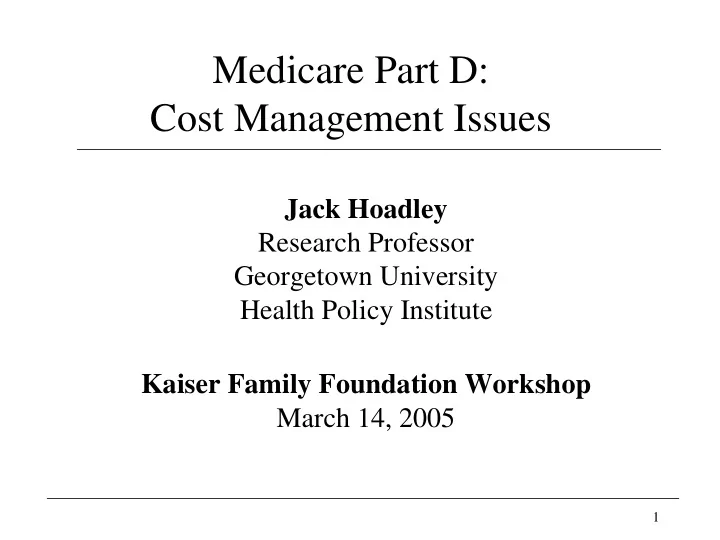

Medicare Part D: Cost Management Issues Jack Hoadley Research Professor Georgetown University Health Policy Institute Kaiser Family Foundation Workshop March 14, 2005 1
Plan Options for Managing Costs • Formularies • Tiered cost sharing • Prior authorization • Quantity limits • Step therapy • Therapeutic substitution • Generic substitution 2
Basic Rules Plans Must Follow • Nondiscrimination criterion • Therapeutic classification system • Pharmacy & therapeutics (P&T) committee • Actuarial equivalence • Exceptions and appeals 3
Nondiscrimination Criterion • Statute: Disapprove if design and benefits are likely to substantially discourage enrollment by certain beneficiaries • Rule: Adequate coverage of the types of drugs most commonly needed by enrollees, as recognized in national treatment guidelines • Preamble: Offer complete treatment options for a variety of medical conditions 4
Therapeutic Classification System • USP model guidelines – Level 1: 41 therapeutic categories – Level 2: Pharmacologic classes • Result: 146 category/class combinations – Level 3: Key drug types (119) • Plans may substitute their own system 5
Two USP Categories (blue=category, green=class, orange=key drug type) Anti- Analgesics depressants MAO Opioids Inhibitors Reuptake Long-acting Short-acting Inhibitors Non-opioids SSRIs SNRIs Tricyclics Cox-2 Nonspecific Other Anti- Inhibitors NSAIDs depressants 6
Standards for a Formulary • 2 drugs per category • 1 drug per key drug type • Majority of drugs in selected classes • Drugs cited in national treatment guidelines • Drugs reflected across risk adjustment categories • Drugs in commonly prescribed drug classes • Special rule if tier for high-cost drugs 7
Sample USP Category, 3 Classes, and 3 Key Drug Types ANTI-DEPRESSANTS MAO Other Anti- Inhibitors Depressants Nardil Wellbutrin Parnate Maprotiline Remeron Desyrel Reuptake Inhibitors Tricyclics SSRIs SNRIs Amitriptyline Celexa Cymbalta Amoxapine Lexapro Serzone Clomipramine Prozac (Fluoxetine) Effexor Desipramine Fluvoxamine Doxepin Paxil Imipramine Zoloft Nortriptyline Protriptyline Trimipramine 8
Formulary Meeting Statutory Standard Anti-Depressants MAO Inhibitors Other Anti- Nardil Depressants Parnate Wellbutrin Desyrel Reuptake Inhibitors SSRIs SNRIs Tricyclics [None] [None] Desipramine Nortriptyline 9
Formulary Meeting Key Drug Type Standard Anti-Depressants MAO Inhibitors Other Anti- Nardil Depressants Parnate Wellbutrin Desyrel Reuptake Inhibitors SSRIs SNRIs Tricyclics Zoloft Effexor Amiptyline 10
Formulary Meeting Majority of Category Standard Anti-Depressants MAO Inhibitors Other Anti- Nardil Depressants Parnate Wellbutrin Desyrel Reuptake Inhibitors SSRIs SNRIs Tricyclics Fluoxetine Effexor Amiptyline (generic Prozac) Amoxapine Zoloft Clomipramine Doxepin Imipramine Nortriptyline 11
Tiered Cost Sharing and Actuarial Equivalence • Plans may modify coinsurance or other cost sharing • Constraints imposed by actuarial equivalence – Plan may modify 25% coinsurance or substitute copays – May also lower deductible, change initial coverage limit, modify cost sharing in catastrophic range – Must account for shift in use • Guidance: not all drugs can be in high tier • Self-attestation by plan actuary; CMS review 12
Actuarially Equivalent Tiered Cost Sharing Options DRUG STANDARD PLAN 1 PLAN 2 PLAN 3 Nardil 25% 20% 2% 65% Parmate 25% 20% 2% 65% Paxil 25% 30% 35% 10% Zoloft 25% 30% 35% 10% Effexor 25% 20% 2% 65% Amitriptyline 25% 5% 2% 65% Doxepin 25% 5% 2% 65% Wellbutrin 25% 20% 2% 65% Remeron 25% 20% 2% 65% 13
How Will the Consumer Be Protected? • Plans need to meet requirements – P&T committee decisions • Plans will look to the market – Consider impact on enrollment • CMS Review – Review basic requirements – Test formularies against guidance standards – Review against best practices • Exceptions and Appeals 14
Consumer Protection Issues • Will CMS have enough time and resources for a thorough review of formularies? • Are some features hard to review in advance? • How will midyear changes be handled? • Will the formulary rules be adequate? – More drugs covered versus more competition & lower prices • How much variation should there be across categories? • Should actuarial equivalence be met in each class? • Will exceptions and appeals process do the job? 15
Recommend
More recommend